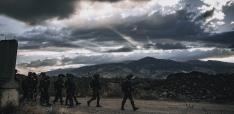Ukraine and the Changing Normative Architecture of World Order

Ramesh Thakur argues that we're experiencing an international order in transition, with terrible consequences for Ukraine, few options for NATO and big wins for China.
Russia’s actions are illegal, immoral and could possibly amount to war crimes. That will be of little consolation if Ukraine is reduced to ashes with tens of thousands killed in prolonged deadly fighting or the world is incinerated in a nuclear war.
As we began the 21stC, the Responsibility to Protect (R2P) was part of a pivotal rebalancing of interests and values. In the old world order, international politics was a struggle for power. As Thucydides (History of the Peloponnesian War) put it: ‘The strong do what they can and the weak suffer what they must.’ The still-inchoate new international politics, some of us argued, was about the struggle for the ascendancy of competing normative architectures based on a combination of power, values and ideas.
That is, rebalancing of power and principles doesn’t equal displacement of power by principles. History does not end, combat-effective military might (whose essential underpinnings include economic-industrial-technological capacity) remains the key determinant of states’ rank in the power hierarchy, and major powers have the greatest ability to define the contours of the international order in any given time, to perturb that order, to defend that order, and to set the core principles, norms, practices and institutions that together make up the order.
On this balance-of-power side of the equation, seven axioms:
- Every great power needs an organising principle of foreign policy;
- Great powers rise and fall on the tide of history and their territorial borders, spheres of influence and buffer zones are continually readjusted;
- No power remains great forever;
- No great power retreats forever;
- There’s no way to reliably judge in real time whether a great power has begun its descent into permanent decline, or is merely in temporary retreat;
- Geopolitical fault lines during periods of power transition are fraught with grave risks of war rooted in miscalculations of relative power; and
- The fate of lesser powers caught in the crossfire of great power contests is as much determined by the outcome of those contests as by their own efforts.
In turn, I draw three policy conclusions from this list of the ‘iron laws of history’:
- Every country should try to get an accurate assessment of the prevailing and projected balance of power that is neither self-defeatingly rosy nor self-fulfillingly pessimistic;
- Great powers pay more heed to the power end of the equation;
- It is in the interests of the majority of states and peoples to deepen and consolidate the normative architecture. But to endure as a robust and resilient set of principles, institutional arrangements and state practices, this (a) cannot depart too far from the underlying power distribution as a structural pull, and (b) has to be universally and not selectively implemented.
A good current example of the great power/majority difference in approach is the ‘NPT only’ vs. ‘NPT+Ban Treaty’ coalitions on nuclear weapons. In the UN system, the divide is embedded in the Security Council as the geopolitical centre of gravity and the General Assembly (GA) as the normative centre of gravity. Enter R2P whose adoption and refinement as a norm is done by the GA but the Security Council is responsible for enforcement.
R2P redefined the terms of the relationship between citizens and the state; and between the state and the international community; but not between states directly, only as mediated through mandated institutions of the international community. Thus it’s not a broad-based prohibition against all use of force, but only one component in a broad and extensive cluster of laws and norms regulating the use of force. R2P applies to mass atrocities against civilians by any armed group, including police, paramilitary and military forces. Once dissent crosses into armed resistance and civil war breaks out, R2P becomes steadily less relevant. And it is not applicable to interstate warfare.
Nevertheless:
- All armed conflict, civil as well as interstate wars, are still governed by the laws of armed conflict that regulate both when large-scale force may be used legitimately against enemy forces and how force may be used. As shown by the lopsided vote of condemnation in the General Assembly on 2 March, Russia’s invasion violates the most foundational norm of all underpinning the international order, namely state sovereignty and territorial integrity;
- All laws and norms serve two essential functions: permissive-enabling (licence) and restrictive-constraining (leash). This was a key conceptual difference between humanitarian intervention in Kosovo in 1999 as a unilateral, ad hoc and divisive principle claimed as an emerging new norm by NATO; and its replacement by R2P as a rules-based, consensual and collective intervention. A second respect in which R2P principles touch upon the Ukraine crisis is the responsibility to prevent, which includes critical components of good governance practices between different groups of people in a country. As we know, much of the charges and counter-claims between the conflict parties pertain to how the Russia-sympathetic population in eastern Ukraine was being treated, and respect for vs violation of their human rights. As I am not an expert on Ukraine, I will leave this for others but just note it in passing.
Structural Causes of the Crisis
The Ukraine crisis shows that the post-Cold War readjustments of great power relations is still not complete.
The US bet the house on the end of history thesis and the belief that Russia as a major power had permanently declined. It ignored their own successful history of how they had treated Germany, Italy and Japan – the defeated Axis great powers of WWII – that was itself based on ‘lessons learnt’ after the punitive 1919 Versailles settlement that facilitated the rise of Hitler. Instead of treating Russia with respect and generosity of spirit, they repeatedly rubbed its nose in the dirt of its historical defeat in the Cold War. In so doing:
- They destroyed some precious legacies: the goodwill of the Russian people who had emerged from their Communist nightmare with remarkably positive feelings for the West and its values; the exceptional outcome of a peaceful end to the Cold War with the defeated side acquiescing to the terms of the new European order;
- They violated the multiple understandings that had been given to Gorbachev about not expanding NATO eastwards. Whenever this is brought up, the Americans get all lawyerly on us (Joshua Shifrinson, ‘Put it in writing’, Foreign Affairs, 29 October 2014), just as they did in the Vietnam War vis-à-vis the 1954 Geneva Accords;
- They have ignored their own serial breaches of international law and principles, as in dismissing the World Court’s verdict against the US for the campaign of destabilisation against the Sandinista regime in of Nicaragua in 1986, invasion and occupation of Iraq in 2003, exit from the Iran nuclear deal, and threatening to arrest the ICC special prosecutor;
- They have ignored the precedent-setting importance of their actions;
- They have lost the generation of senior people with the institutional memory of dealing with Russia as a quasi-equal power.
All this is important because the great-power centric international order is still in transition and there is no question but that China has taken very careful note of how a great power behaves in structural condition of unchallengeable supremacy and primacy:
- China must believe it cannot trust US verbal promises to refrain from harmful action against core Chinese interests, nor the institutions designed to uphold and enforce international law. Washington has an unsavoury record in weaponising trade policy and abuse its dominance of international financial institutions to penalise those who refuse to kowtow to its diktats. Claims to purely defensive motives notwithstanding, given the opportunity, not all future US administrations will be able to resist the temptation to convert Taiwan into a launching pad for aggression against China.
- Rather than be a mere rule breaker, like all hegemons, China aims to become the preeminent rule maker and enforcer in a future Sinocentric global order. That is the ultimate nightmare for Western countries. Although this is far from inevitable, on present trends, for the first time in several centuries, the global hegemon is poised to be a non-Western, non-English speaking, non-democratic and non-market economy civilisation. Can the West adjust psychologically to learn to live in such a world?
Proximate Causes of the Crisis
NATO expansion, Kosovo 1999, Maidan coup 2014, Putin’s belief that Russia has recovered sufficiently that it can stop retreating under continued Western pressures and instead can start regaining some of the lost spheres of control and influence, are all part of the cluster of events and factors leading to the present crisis. Insistence on principle of sovereignty is self-justifying for NATO. There are parallels between US–UK–Australian aggression against Iraq in 2003 and Russian in Ukraine this year; between Kosovo in 1999 and Crimea in 2014; between US rejection of Cuba’s sovereign right to enter into a security alliance with the Soviet Union and station Soviet missiles in 1962 and Russian rejections of comparable right asserted for Ukraine. In the last, the common overriding theme is the vital security interest of a great power on its borders. Does anyone believe the US would accept hostile enemy forces stationed in Canada or Mexico regardless of what the latter’s governments wanted? Regarding NATO rejection of Putin’s twin requests to guarantee no membership of NATO for Ukraine, ever, and withdrawal of NATO troops from eastern Europe, why is this different from every Western government’s policy on Taiwan? The latter is not even accorded the dignity of diplomatic recognition, official embassies and membership of international organisations.
The difference is this. Realism rules in the Pacific where almost all countries have first formulated a China policy and then accommodated relations with Taiwan within that strategic framework. But in Europe, NATO members have made the fate of Ukraine the central organising principle of their relations with Russia. If you want to play hardball in great power relations – we are accepting former Warsaw Pact countries as NATO members, bombing Serbia into submission, intervening in Ukraine’s internal affairs to back a coup against the elected but pro-Russian government – wanna make something of it or suck it up, tough shitsky? Fair enough. But then you’d better make damn sure that your analysis is accurate. The brutal reality is NATO played hardball, won in the short term but now finds itself at the receiving end as Putin decides it’s payback time and lays down the challenge: what you going to do about it? Putin’s history of reminders of his nuclear forces since 2014, including the most recent very public elevation of the alert level, is criminally irresponsible. But do we really want to risk an all-out nuclear war?
For reasons of history, geography, culture and language the stakes for Russia, no matter who the ruler, are enduringly greater than for any other major power. There is an essential continuity in the Russian narrative of post-Cold War grievance from Gorbachev through Yeltsin to Putin. In a speech to the Munich Security Conference in February 2007, Putin accused the west of forgetting and breaking assurances on no eastwards expansion for NATO. In 2008 in Georgia and in 2104 in Ukraine, he made it clear Russia had red lines that he would not allow NATO and the EU to cross without hard pushback.
The US Senate ratified the decision to enlarge NATO in May 1998. The New York Times columnist Tom Friedman called George Kennan, the architect of the Cold War containment doctrine, to seek his opinion. ‘I think it is the beginning of a new cold war’, Kennan said. ‘Of course, there is going to be a bad reaction from Russia, and then [the NATO expanders] will say that we always told you that is how the Russians are — but this is just wrong’.
The big strategic victor of the Iraq War was Iran. The big strategic victor of any NATO-Russia war will be China. That is not a comforting thought for those of who live in the Indo-Pacific region.
What then might be the endgame? At what point should we stop cheerleading for valiant Ukraine and urge its leaders to cut their losses and sue for peace, to save their country and themselves? We might give more arms and provide intelligence, but there will be no NATO planes over Ukraine nor boots on the ground. Before the war, Ukraine’s NATO ambitions and the reabsorption of Crimea into Russia were non-negotiable. Are they negotiable now?
Emeritus Professor Ramesh Thakur, Crawford School, Australian National University, is senior research fellow of the Toda Peace Institute, a fellow of the Australian Institute of International Affairs, and a former United Nations Assistant Secretary-General.
Photo by Rachel Claire from Pexels


